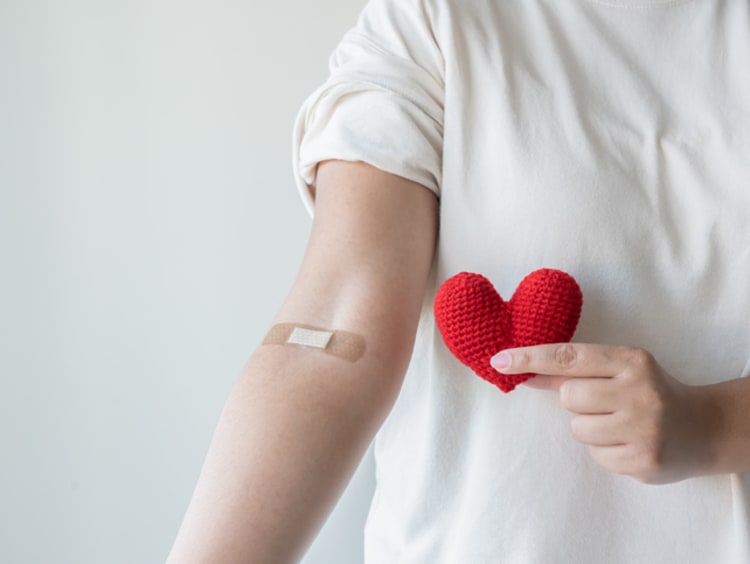The Many Benefits of Donating Blood

From classes and study groups to clubs, sports and more — there is no end to the activities available to college students on campus and around the community. But what about saving someone’s life? Yes, even that! Indeed, any college student could potentially save someone else’s life, and perhaps the surest way is by donating blood.
If you’re eligible, you could give blood to a community member in need. Learn about the benefits of donating blood (including the surprising health benefits of giving blood) and learn how to take the next steps toward being someone’s hero.
In This Article:
- A Look at the Benefits of Donating Blood
- Blood Donation Is Safe
- Excited About the Importance of Donating Blood?
A Look at the Benefits of Donating Blood
Why donate blood? There are so many compelling reasons to give blood. First and foremost, you’ll be helping doctors save lives.
Beyond the altruistic reasons, however, there are plenty of other benefits to why you should donate blood. For example, did you know that donating blood is good for your own health? Learn all about the benefits below.
Blood Donation Saves Lives
The importance of donating blood cannot be overstated. In addition to the health benefits of giving blood that you could gain, you could also save someone’s life. According to the American Red Cross, one donation could potentially save even more than one life!1 But that’s not all — consider this additional information from the American Red Cross:1
- Someone in the U.S. is in need of donor blood or platelets every two seconds.
- Every day in the U.S., hospitals need 29,000 units of red blood cells for their patients, along with nearly 5,000 platelet units and 6,500 plasma units.
- Just one victim of a severe traffic accident could require up to 100 units of blood in order to survive.
- Trauma patients aren’t the only ones who rely on donor blood; cancer patients, sickle cell patients and others also need donor blood to survive.
- It is not possible to synthetically manufacture blood and platelets. Every unit of blood given to a patient must be donated by a living person — like you.
Enjoy the Health Benefits of Giving Blood
You already know that generously giving your blood can help save someone else’s life. But did you know that donating blood can also benefit your own health and wellness? Here’s a look at how it works.
- Mini Exam: As a busy college student, it can be challenging to find the time to visit a primary care physician for a wellness check-up. Although it cannot replace a standard yearly physical, the mini physical exam you’ll get during your blood donation appointment can certainly help support your own health. In fact, it’s possible that your mini exam will pinpoint potential health concerns long before you would have otherwise become aware of them. If there are any red flags (e.g. infectious diseases, high blood pressure or heart arrhythmias), you’ll be able to follow up with a doctor in a timely manner and get the treatment you need.
- Potentially Achieve Better Cardiovascular Health: Although the study results are mixed, it’s possible that donating blood regularly may support better cardiovascular health. It is thought that because donating blood reduces your body’s supply of iron, you’ll then be at a lower risk of developing a life-threatening heart attack.2
- Mental Wellness: According to the Mental Health Foundation, altruistic acts such as donating blood can strengthen your own mental health and emotional wellness. It can reduce feelings of isolation, create a sense of belonging and improve one’s outlook on life.3
Receive Incentives
Another benefit of donating blood is that you may be eligible for incentives. Every Red Cross blood donation center will offer a small snack following your donation (which you should accept to reduce the risk of side effects).1 However, some centers may also offer special promotional items aimed at getting more feet (and blood!) through their door. These can include gift cards, which can certainly prove tempting to budget-conscious students.
Blood Donation Is Safe
Blood donation is safe for both donor and recipient. For the recipient, blood donation is safe because all donated blood is rigorously screened.2 For the donor, this selfless act is safe for many reasons, including the following:
- The technician will check your health history to ensure that you don’t have a condition that could make it unsafe for you to donate blood.
- You’ll receive a mini physical exam prior to donating blood to ensure that you’re healthy enough to donate.
- It’s impossible to acquire any infectious disease from donating blood because the technician uses a brand-new, sterile needle for each donor. No needles are ever used more than once.2
Even if you’re afraid of needles, you can donate blood to save someone’s life. Let the technician know that you’re fearful of needles, and they will do everything possible to help you relax and talk you through the process.
It should be noted that it’s possible to develop some side effects during and after giving blood. These include lightheadedness, dizziness and nausea. Drinking water and eating before donating and resting for 10 to 15 minutes prior to leaving the donation site will curb these temporary side effects.
Excited About the Importance of Donating Blood?
Now that you know the many answers to the question, why donate blood? you may be eager to get started. Here are your next steps to take toward helping to save lives.
Find a Donation Site
There are two primary ways in which you can donate blood. You can go to a blood drive, which is a pop-up event that encourages people in the community to give blood. Alternatively, you can search for a blood donation site near you and make an appointment to give blood any time of the year.
You can use the Find a Blood Drive tool on the website of the American Red Cross to locate a site. The Association for the Advancement of Blood and Biotherapies also has a Blood Donation Site Locator tool.
Some colleges make it even easier for students to give blood. At Grand Canyon University, for example, our student government routinely holds one or two blood drives each semester in partnership with Vitalant — a reputable blood collection company that performs health screenings and otherwise adheres rigorously to established blood donation guidelines.
Get Ready To Donate
Before you head off to the donation site, there are a few items you’ll want to bring with you. Bring your ID and some information about your medical history, because you’ll be asked questions about your health. If you’ve ever traveled outside the U.S., your travel history could also prove relevant. For example, if you visited a particular country during an outbreak of mad cow disease, you might be disqualified from donating blood.
In addition, follow these tips for donating blood:
- Eat a low-fat meal (or at least a snack) beforehand to reduce the risk of side effects, and eat the snack that is typically offered to you after donating blood.
- Drink lots of water beforehand, which supports your health and makes it easier for the technician to stick your vein.
- Take an iron supplement or a multivitamin that contains iron, especially if you donate blood frequently.
- If you’re going to exercise on your blood donation day, do so beforehand, rather than afterward. You may be more likely to become dizzy if you work out after donating.
Follow Up on Any Health Issues
If your mini health screening at the blood donation center reveals that you have any potential health concerns, it’s important to be proactive about your health and follow up with a physician to see whether you will experience the health benefits of giving blood. If you don’t have a local primary care physician at your campus, you can visit the on-campus health center.
At GCU, our Christian worldview encourages our students to do their part to give back to the community. GCU is also committed to supporting the health and wellness of each of our students via the Canyon Health and Wellness Clinic, which offers follow-up health appointments for students who have donated blood and were found to have potential health concerns. Complete the form on this page to learn more about joining our vibrant learning community.
1 American Red Cross. (n.d.). Importance of the Blood Supply. American Red Cross. Retrieved April 11, 2023.
2 Santos-Longhurst, A. (2019, June 26). The Benefits of Donating Blood. Healthline. Retrieved April 11, 2023.
3 Mental Health Foundation. (n.d.). What Are the Health Benefits of Altruism? Mental Health Foundation. Retrieved April 11, 2023.
Approved by the front office manager of the Canyon Health and Wellness Clinic on June 6, 2023.
The views and opinions expressed in this article are those of the author’s and do not necessarily reflect the official policy or position of Grand Canyon University. Any sources cited were accurate as of the publish date.


